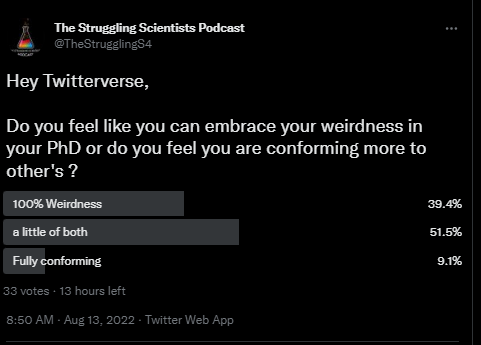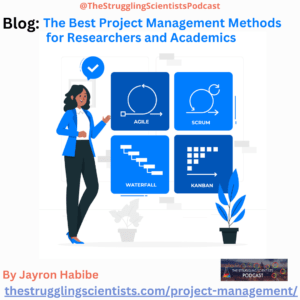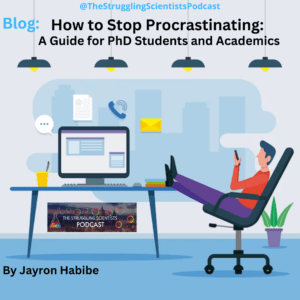“Embracing your weirdness” means to be your authentic unapologetic self. Now this isn’t always easy and its going to depend on you what that even means or looks like but it is something everyone should strive for. At least thats my personal opinion on it.
Because it’s so specific to the individual the best thing I can do for you to elucidate it is to provide you with my own personal example. So here goes as I once again open myself up to people on the internet XD.
For me as a PhD student, it meant coming to grips with the fact that I would never be as productive as many of my colleagues. It meant that I needed to be okay with my limitations as a PhD. In return, it freed me up to explore other possibilities, hobbies, interests, and options that I never would have otherwise if I had just stuck with not being weird.
So while deciding to pursue some additional hobbies and interests I stumbled upon some indirect benefits for my PhD as well. This included a better prioritization of my workload as well as improved work-life balance.
Here are a few concrete examples of what my brand of weirdness looked like once I decided to embrace it.
By embracing my weirdness I’ve gotten the opportunity to do many things like:
- Write blogs
- Start a podcast
- Run a marathon
- Start a Newsletter
- Learn about investing
- and grow The Struggling Scientists on Social media … Turns out I actually really like Twitter … who knew?
These are just some of the many benefits embracing my weirdness has had on my life. Before leaning into it, I was often focused on how I stacked up as a PhD student vs everyone else. Whether I was smart enough, working hard enough, living up to expectations, getting great results, or not all that was my focus.
This unfortunately made me very unhappy in my third year of my PhD and made me consider quitting. By embracing my weirdness, I managed to get clear on several things in my life and I am doing better for it. Both as a former PhD student now who is finishing up their thesis and as a person in general.
In a recent poll we ran on Twitter, almost half of responders said they balanced between conforming and going full weird while almost 10 % of of people were fully conforming. While I am glad to see that almost 40% of people felt able to be themselves it is not enough in my opinion.

When it comes to embracing your weirdness it isn’t always easy as we will soon get to but it also comes with numerous benefits especially in your PhD as we will get to.
Advantages of Embracing Your Weirdness
There are many advantages to embracing your weirdness, especially as a PhD student given the combination of intellectual, creative, analytical, and often collaborative work we do. That being said, it may come with some drawbacks especially at first so here are a list of pros and cons related to embracing your weirdness.
The Pros
- Reduced stress
- Deciding what you will and won’t do
- Understanding your strengths and weaknesses
- Acceptance of them and everything that made you you
- Doing things you enjoy and are good at because you want to
The Cons
- It might be too weird for some
- It can feel lonely
- It won’t be easy
To embrace your weirdness, you’ll need to get honest with yourself about what it is you truly want, need, and value. Likewise, it also means getting clear and rid of what you don’t need, don’t want, and couldn’t give a F*ck about.
Why is it so hard to Embrace Your Weirdness?
If embracing your weirdness was easy we would have all done it a long time ago and no one would be reading this blog post. Sadly, it’s much harder than most of us think, and most of the time we are too wrapped up in the stuff that we are doing to care whether or not we are being true to ourselves.
To get to where we are as PhD students we’ve had to work hard while also being accepted by our peers.This meant that consciously or not we’ve been trying to impress other people our whole lives.
From parents to teachers, to examiners to our supervisors now. By trying to impress others we may have inadvertently adopted their values and silenced our own at least partially.
How To Easily Embrace Your Weirdness as a PhD
In all honesty, it might be easy to get to the point where we are all embracing our weirdness but I think the real challenge is maintaining it afterward. Especially, when you consider how much we’ve had to adapt ourselves to other people up until now.
So the first thing we will need to do is to define what our brand of weird looks like.
Define what weird looks like for you
The first step to solving any problem is to define what the problem is. If we have a quick look back at the Twitter poll we see that > 60% of the responders indicated that they were conforming either partially or completely. While conforming can be great and allows society to function at least in large part it can also stifle individuality and novel ideas which is the exact opposite of what we’d want from PhD students.
Once you’re clear on what exactly your values, needs, and wants are and what the opposites of those are you can start trying to make them happen. Below are four concepts that will help you clarify, motivate and illustrate the long term benefits of embracing your weirdness.
Memento Mori
Imagine yourself on your deathbed years from now. What will you look back at with fondness or regret? Never ran that marathon? Never started that business idea you had when you were younger? Never asked that guy or girl out? Life is short no point in not doing the things we dream of doing!
Memento mori refers to the concept that is often discussed in Stoic philosophy which centers around thinking about death. In fact, in his book Meditations the Roman emperor Marcus Aurelius asks the reader to contemplate how ephemeral mortal things are.
Now you might be wondering what does the stoic concept have to do with being weird as a PhD student. Well, on the surface not much but when you consider that you only have one life to live and a limited amount of time on this Earth would you actively choose to be this conforming, people-pleasing person? Or would you instead prioritize yourself and what you really want to do?
Think about it. Even for the next few years, that you will be busy with your PhD. Would thinking about the end change some of the decisions you make? Would it make you go from a shot term thinker to more long-term thinking?
Whatever decisions you end up making the one thing that will be clear from applying memento mori is that it will be a deliberate one based on your values and it might not make sense to most people.

Mimetic Desire
Many people go through life not knowing what they want and instead pick up the desires of others to fill that void. Sadly, the most prestigious job, the biggest house, or the best vacation won’t make you happy. I guess the academic equivalents of these would be a grant, a prize, or a high-impact paper.
Those are just the things society sells us as a cheap substitute for real happiness. Admittedly, none of us got into doing a PhD program because we cared a lot of about impact factors. What we cared about was either doing good research or contributing to advancing human understanding and knowledge.
Unfortunately, along the way we start to adopt the mindset of those around us who focus on impact factors after all we want to be competitive and stay in academia don’t we?
The moment you realize that mimetic desire sometimes stands in the way of you and the real things you want and want to achieve in life you can start to avoid it and prioritize your real goals and values.

Differentiation
Everyone has different skills and interests which ultimately decide what they will go on to do in life.
You’re probably doing something that’s completely different from what anyone in your kindergarten class is doing now. So given that we know we are different why then do we try so hard to squash that difference in favor of conformity?
It’s difficult to be different from the rest. For most of our evolutionary history, we’ve faced social pressure to conform to the group as belonging to a group was beneficial to our survival. This unfortunately meant silencing many of our own thoughts and insights in favor of the group. Now that we no longer face constant threats for survival we still find it difficult to shake off the remnants of this group think and just be ourselves.
Although it is difficult it is where most of our growth will happen and in time will help us not only find our niche but also acknowledge and accept our unique strengths.

Competitive Advantage
The last great reason to be your weird self is that it can afford you some competitive advantages as a PhD student. Now none of us are doing a PhD because of the luxurious salary that comes with it. We do it because we enjoy doing research and learning and contributing to new discoveries and human knowledge.
Despite the love for research we may have something that will admittedly be true is that there will be things that we are better at and enjoy doing than others things. You may enjoy doing confocal microscopy vs electron microscopy, Western blot vs qPCR, or bioinformatics vs wet lab work. If this is the case, then it may be worth considering if you can develop those interests and skills further.
The reason is that if you enjoy doing something that you are good at chances are you will keep learning it and keep improving in it. The more niche and weird your skill and interest sometimes the better as it can help you stand out from the crowd.
And to be clear you’ll want to stand apart from the crowd if you want to stand out and continue working in academia. There are just ways to accomplish that that don’t involve you burning yourself out working to achieve it.
"No one in the world is going to beat you at being you."
Naval Ravikant










